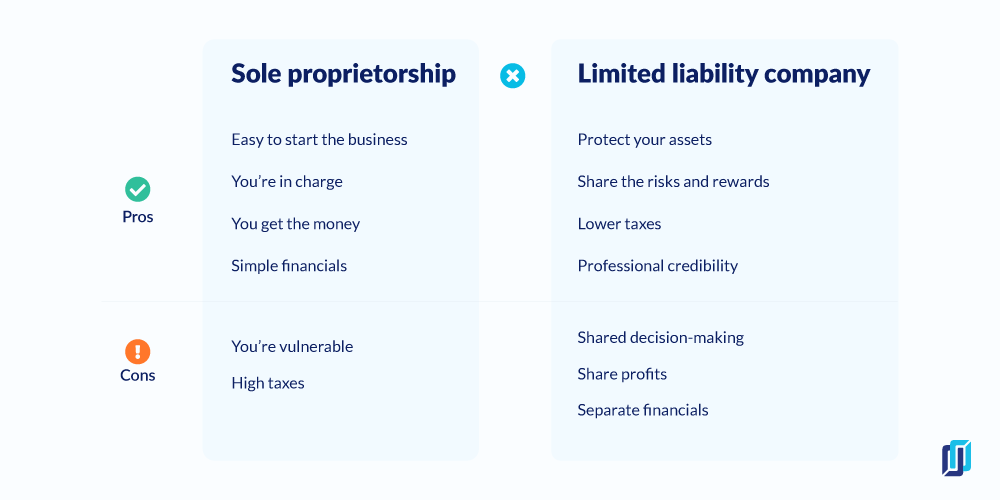
How your contracting business is organized has a tremendous effect on your vulnerability to risk and the amount of taxes you’ll pay. When starting out, most contractors organize as sole proprietors because it’s the easiest and simplest. As your business grows, however, you may find you want to change to a limited liability company or LLC. We’ll look at the differences between being a sole proprietor vs LLC, and walk through the steps of converting your business.
What’s the difference between a sole proprietor vs LLC?
A sole proprietorship is an unincorporated business that is owned and run by one person, while an LLC is a corporate entity formed at the state level. An LLC is separate from its owners or partners, and they aren’t personally responsible for the debts and liabilities of the company.
Sole proprietor vs LLC: Pros and cons for contractors
When deciding whether to run your business as a sole proprietorship or a limited liability company, there are several pros and cons you should consider.

Sole proprietorship
Pros
- Easy to start the business: A sole proprietorship is easy to start, as you can do business under your own name without filing any paperwork, or you can choose a company name and register the business using an assumed name, called a DBA (doing business as).
- You’re in charge: In a sole proprietorship you run the business and make all business decisions.
- You get the money: All the profits from the business are yours to keep, less taxes, of course.
- Simple financials: Sole proprietors don’t have to get a separate bank account for their business, since all the income is taxed through them personally. However, a separate bank account is recommended.
Cons
- You’re vulnerable: As a sole proprietor, you get all the income — but you are also responsible for all the debts and liabilities of the business. If you can’t pay a bill or you are sued, your house and personal possessions could be used to pay the debt.
- High taxes: Since all the income and debts are yours personally, you pay self-employment tax on all the profits of the business.
Limited liability company
Pros
- Protect your assets: Since an LLC is a separate legal entity, if it incurs a debt that cannot be paid or is involved in a lawsuit, your personal assets are not at risk.
- Share the risks and rewards: You can add partners (called members) to your company with an LLC, and they share the risks and rewards with you.
- Lower taxes: LLCs can choose to be taxed like a corporation. If you choose this and you and the other members are paid a salary, you are only taxed on the salary you receive, not the total profits of the business.
- Professional credibility: Choosing to create an LLC can add credibility to your business. Customers think they are dealing with a larger organization, even if it’s just you.
Cons
- Shared decision-making: If you decide to add members, you will have to share business decision-making with them. You can also hire a manager to make these decisions for you.
- Share profits: If you have multiple members, you will have to share the profits with them. Your operating agreement will specify how much each partner receives.
- Separate financials: When doing business as an LLC, you must keep your personal and business financials separate. This means you have to open a special bank account for the business and run all business income and expenses through it.
How to convert a sole proprietorship to an LLC
The process for converting a sole proprietorship to an LLC will differ by state. You can research the process on your state’s Secretary of State website.
Here are the general steps that a contractor can expect in converting to an LLC:
1. Choose a name for the business
You’ll need to choose a name for your business. It can be your name plus “Contractor,” “Builder,” or anything else, as long as it is unique. To check for other businesses that might be using the same name, check your state’s business registry, the Federal Trademark and Patent Office, and do an internet search for companies with the same name. You’ll also want to check for domain name availability for your website.
2. File state articles of organization
Once you’ve selected the name of your business, you’ll need to register the business name with the state it’s located in. Most states have a simple form, called articles of organization, that you fill out with information about the company. This usually includes the members’ name and address, and a representative for the business that lives in the state.
The cost for filing articles of organization generally runs from $50-$500, and it must be renewed annually.
3. Write up an operating agreement
If you have more than one member in your LLC, then it pays to write up an operating agreement to document how you will do business.
Include things like how decisions will be made, how profits will be split, and what roles the members will take in the company. You can use online legal document generators to help write your operating agreement or consult with an attorney.
4. Request a new EIN
If you are a single member LLC, you have the option of using your Social Security number as your tax identification number for the business. You can also request an Employer ID Number (EIN) whether you are a single member or multiple member company. This number is used as your tax identification number and for employment taxes.
5. Purchase business insurance
You’ll need to purchase new general liability and workers comp insurance for your new company.
6. Open a bank account
Once you have your EIN, you can open a new bank account under your company name. As an LLC, your business expenses have to be kept separate from your personal, so opening a bank account for your business is a good idea.
7. Update contractor licensing
In some states, you may be able to transfer your contractors license from your personal name to the new business. In others, you may have to apply for a new license, especially if you have multiple members.
8. Register with the state
Most states will require you to register for payroll liabilities and/or sales tax.
9. Update or apply for other permits and licenses
There may be specific permits and licenses that you need in order to do business in your location, such as a city business license. You will need to update all licenses and permits with the new company information.
Is it time to make a change?
If your business is growing, you want to take on partners, or you’re looking to protect yourself from risk to your personal assets, it may be time to convert your sole proprietorship to an LLC.
Follow the guidelines for your state on forming an LLC. If you have any questions regarding the process or need help, consult an attorney.
